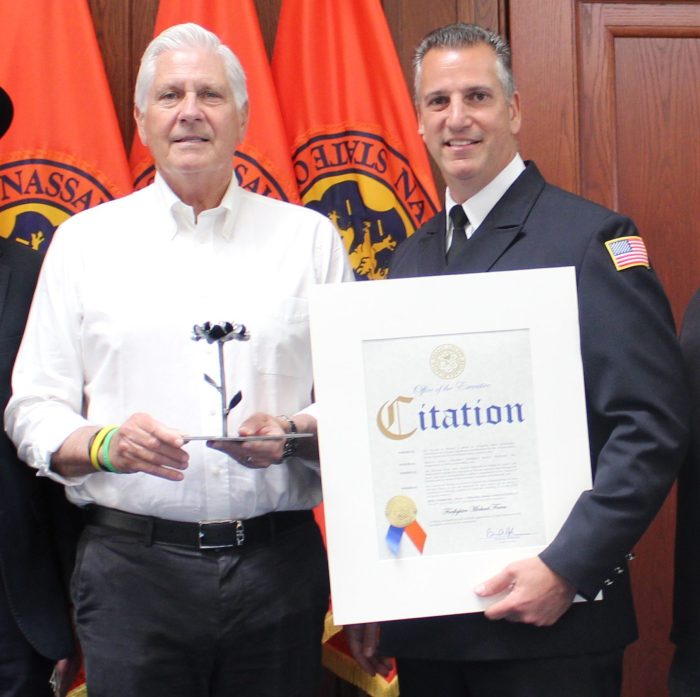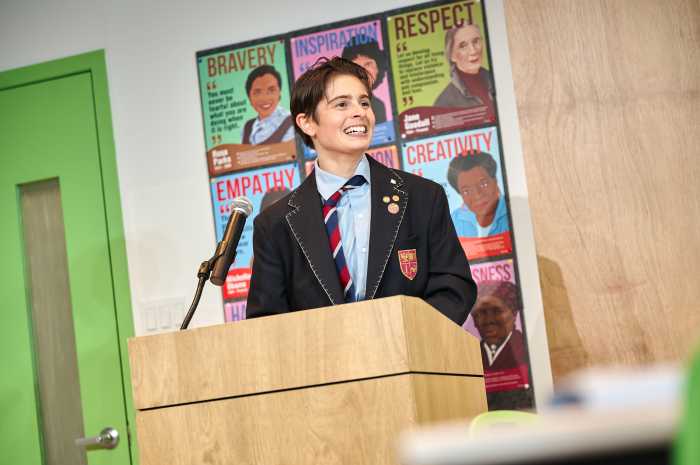Board Approves Boiler Funding, Bus Eligibility Propositions for May 17 Ballot
At the Floral Park-Bellerose Board of Education workshop meeting held on Thursday, March 24, in the John Lewis Childs School Auditorium, Superintendent Dr. Lynn Pombonyo outlined ways in which the district could fund capital projects for the 2011-2012 school year. Discussions about the two antiquated boilers at Floral Park-Bellerose School sparked heated responses from audience members, who questioned the board’s prudence in installing two new playgrounds instead of replacing at least one boiler.
Capital projects, such as boiler replacement, can be funded by money allotted from the overall district budget; bonds, similar to the $5 million bond that was voted down last November; the district’s capital reserve fund, which was set up in 2008 with $400,000 and has since accrued interest and currently stands at approximately $403,000; and energy performance contracts (EPCs), which implement renewable energy systems that could yield savings to help fund other capital projects.
To be sure, the board has done its due diligence on EPCs. The New York Power Authority (NYPA), a government agency, has completed a feasibility study of the administration building and both schools to provide a general sense of energy efficiency opportunities that would result in feasible projects that the district could implement. NYPA provides a turnkey process, meaning it would take the district from the initial meeting and feasibility study all the way through project construction.
Alternatively, ECG Engineering, LLC, has performed its own energy audit of the district. ECG would act as the district’s technical consultant, facilitating a partnership between the district and an energy services company (ESCO).
The New York State Education Department mandates that an EPC must have a simple payback of 18 years. NYPA is still crunching the numbers and hopes to cash in on recent LIPA rebates to come in under an 18-year payback, according to manager of business development Tony Savino, who gave a presentation at the March 24 meeting. Savino added that NYPA offers low-rate – variable but capped – financing, which avoids bonds.
The results of ECG’s preliminary audit suggest that an $800,000 EPC opportunity is possible for the district, based on an estimated 13 percent reduction in energy costs, which is a very conservative estimate, according to David M. Newman, P.E., vice president of engineering at ECG. ECG issued a request for proposals to ESCOs on March 21; proposals are due by May 2. ECG will evaluate the responses and make a formal recommendation to the Board of Education in early June. ECG’s service is paid entirely out of energy savings and does not add additional cost to the project, according to the company.
EPCs are completely separate from the general school budget, Dr. Pombonyo said, adding that they are approved by the Board of Education and not put out for a taxpayer vote.
One audience member expressed concern that at the Oct. 21 bond referendum meeting, taxpayers were led to believe that securing a bond was the only option to fund the boilers. “What has changed? Why are you doing this now?” someone asked.
“We knew from the beginning of NYPA’s preliminary work with us that the boilers were not likely to be done. We had all along planned, as most districts do, to do bond work along with ESCOs simultaneously,” said Dr. Pombonyo. The difference is, however, that FPBS is a relatively small district and as such receives correspondingly small EPCs.
Savino and Newman conceded that the necessary boiler work at FPBS is too vast and would yield a high payback – longer than 18 years. ESCO-possible projects for the district include fast-payback items such as lighting and lighting controls. The projects from last fall’s bond referendum, including boiler replacements at both schools, clock-tower restoration at FPBS, roof replacements and masonry restoration, are “not ESCO possible,” Dr. Pombonyo said.
Audience members also questioned why money from the 2010-2011 budget was not allotted for at least one new boiler — when the state of the boilers was presented as critical at last fall’s meeting – but money was used to construct two new playgrounds.
Indeed, “It is very difficult to heat [the Floral Park-Bellerose building],” Board of Education President David T. Fowler said at the bond referendum meeting last October. “If the boiler were to have an issue in this building during the school year, it would necessitate, quite frankly, closing the building. It’s a health and safety issue,” he said at the time.
Dr. Pombonyo said the playground equipment at both schools was deemed hazardous to children’s play, which is why new equipment was installed. The cost for the equipment was not disclosed.
Going forward, the board remains committed to replacing the boilers. “The boilers are a priority,” Fowler said. At the March 24 meeting, the board approved a proposition to go on the May 17 ballot to take $403,000 out of the Capital Reserve Fund for one boiler.
Additionally, the board approved a proposition for the third consecutive year to continue expanded bus transportation eligibility, allowing students through sixth grade who live a minimum of one-half mile of their school to ride the bus – at no additional expense to the district.
The 2011-2012 budget is in draft form, as the district awaits state aid figures. The final budget is expected to be presented at the April 11 board meeting.




























